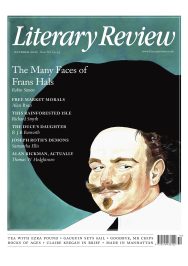Mathew Lyons
A Country Fit for a Queen
Tudor England: A History
By Lucy Wooding
Yale University Press 720pp £30
Just before Whitsunday in the summer of 1549, a fight broke out in the playground of a school in Bodmin. When the dust had settled and questions were asked, the authorities discovered that the children had divided into two gangs, or rather ‘two factions, the one whereof they called the old religion, the other the new’. In this, the children revealed themselves to be remarkably acute commentators on wider social developments. Not long after, on 9 June (Whitsunday itself), the government of Edward VI imposed the Book of Common Prayer on every parish church in England. The time-hallowed Latin mass was replaced with an English text. The West Country exploded with what’s known as the Prayer Book Rebellion, one of the greatest popular risings of the 16th century. ‘If there was a single point in time that separated the old world and the new,’ writes Lucy Wooding in her magnificent new survey of Tudor England, this was it.
Catholics would look back on Edward’s reign as ‘the time that lights were put down’ and which saw ‘all good order broken’. But was that Whitsunday really so pivotal? Wooding’s primary aim is to defamiliarise the Tudor century – that is, to strip away the narratives and assumptions that have accreted to it and reveal how English men and women of the period thought about themselves and the world they lived in. Hers is a deeply human and intimate account, taking in every level of society. One of the key themes that emerges is the importance of reciprocity and consent, of harmony and order in both interpersonal and societal relations. The Elizabethan lawyer John Barston identified five kinds of society: the country itself, the town or village, the craft or guild fellowship, the family, and the ‘society of friends’. These weren’t theoretical concepts but purposeful communities in which everyone participated and which overlapped with each other, manifestations of the shared desire to ‘live in harmony and concord’ and maintain the ideal of the ‘common wealth’. Everything supported and reinforced everything else. ‘Nothing joyeth without society of other,’ one physician wrote.
The pre-Reformation Church, too, was ‘above all else … a body of believers’, Wooding writes. Religious worship was ‘less an intellectual endeavour than a passionate sensory encounter’ in which the spoken word was only one part of the experience. Ritual performance and polyphony were vital. Scent, too: the

Sign Up to our newsletter
Receive free articles, highlights from the archive, news, details of prizes, and much more.@Lit_Review
Follow Literary Review on Twitter
Twitter Feed
Under its longest-serving editor, Graydon Carter, Vanity Fair was that rare thing – a New York society magazine that published serious journalism.
@PeterPeteryork looks at what Carter got right.
Peter York - Deluxe Editions
Peter York: Deluxe Editions - When the Going Was Good: An Editor’s Adventures During the Last Golden Age of Magazines by Graydon Carter
literaryreview.co.uk
Henry James returned to America in 1904 with three objectives: to see his brother William, to deliver a series of lectures on Balzac, and to gather material for a pair of books about modern America.
Peter Rose follows James out west.
Peter Rose - The Restless Analyst
Peter Rose: The Restless Analyst - Henry James Comes Home: Rediscovering America in the Gilded Age by Peter Brooks...
literaryreview.co.uk
Vladimir Putin served his apprenticeship in the KGB toward the end of the Cold War, a period during which Western societies were infiltrated by so-called 'illegals'.
Piers Brendon examines how the culture of Soviet spycraft shaped his thinking.
Piers Brendon - Tinker, Tailor, Sleeper, Troll
Piers Brendon: Tinker, Tailor, Sleeper, Troll - The Illegals: Russia’s Most Audacious Spies and the Plot to Infiltrate the West by Shaun Walker
literaryreview.co.uk